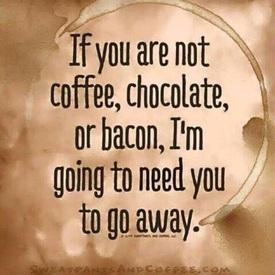Carbs = an addiction?

AngInCanada
Posts: 947 Member
Let me preface by saying I have had a binge eating disorder for more years than not (I'd guess around 17 years). I've tried all different diets and none I ever felt free of the urge and desire to binge UNTIL I started the keto diet 3 months ago. I rarely have the desire to binge, even in times of high stress.
Today my kids went to friends houses and I went out with my mom and we went out for lunch. It was late, everything was busy because today is a holiday in BC, so we went to a burger joint. I figured I'd just indulge a bit and that was it. I had a burger wrapped in lettuce, fries and a diet root beer. As soon as I finished my lunch I had the attitude where I didn't care anymore and felt absolutely completely exhausted. I came home, ate a bunch of chips and dip and ate a piece of chocolate zucchini cake with ice cream. I am kicking myself in the butt now but it really caught me off guard because I haven't had a binge in quite a while.
Is it possible that some people are just so sensitive to carbs? I just feel baffled. And BTW I am not making excuses. I take action for allowing myself to just not care in the moment.
Today my kids went to friends houses and I went out with my mom and we went out for lunch. It was late, everything was busy because today is a holiday in BC, so we went to a burger joint. I figured I'd just indulge a bit and that was it. I had a burger wrapped in lettuce, fries and a diet root beer. As soon as I finished my lunch I had the attitude where I didn't care anymore and felt absolutely completely exhausted. I came home, ate a bunch of chips and dip and ate a piece of chocolate zucchini cake with ice cream. I am kicking myself in the butt now but it really caught me off guard because I haven't had a binge in quite a while.
Is it possible that some people are just so sensitive to carbs? I just feel baffled. And BTW I am not making excuses. I take action for allowing myself to just not care in the moment.
0
Replies
-
After 40 years of abusing carbs I found them to be toxic like. Not all people will have the same experience.0
-
I have definitely felt like I was addicted to sugar in the past. Pretty much exclusively in the form of candy for me.
I have not allowed myself any of the kinds of candy that I would binge on before. I have been around others eating candy and have been offered some and have been able to say no with no problem so far.
It's definitely different for everyone, but I tend to be pretty strict with myself since changing 3 months ago. I don't think of it like "its no big deal to just have a little this once." I think of it like, "I don't need that. It has nothing to offer me nutritionally, so I'm not wasting the calories on it".
Don't be too upset about losing control though. Think of it as an experiment. What happened today could be what you might expect to happen if you have a similar carb high day again. Or, if you want to have a carby day next time, you can be prepared and may be better at controlling the cravings that may come as a result.0 -
Here is an intetesting article on sugar and the brain. Great food for thought on sugar addiction and how our human brain feeds it. Http://www.iflscience.com/brain/here-s-what-happens-your-brain-when-you-give-sugar-lent0
-
There is a difference between a desire and an addiction
Look at hookers on crack or meth. Then look at what is often called a food addiction.
There is a huge difference
I had food desires or cravings and lacked self discipline and a nutrition plan. I had no exercise plan. All that was easily fixed and turned out to be relatively straight forward
Watching someone we love die from an actual real addiction??
There is no comparison
So no. I wanted carbs and things of that nature. It was relatively easy to get a ha handle on. I know some things really push my food pleasure button. And I need to be mindful of those things and not over indulge!
I can chow down on a fresh hot Cinnabon at the mall... And once a month it may be ok. But I know eating one wakes up the desire for more. So I let it go. Just not worth it
But it isn't an addiction. For me it is just letting food be food, not run my life.
0 -
KittensMaster wrote: »There is a difference between a desire and an addiction
Look at hookers on crack or meth. Then look at what is often called a food addiction.
There is a huge difference
I was addicted to cigarettes for 12 years... never had the urge to pull tricks for a smoke though.
I think you're confusing chemical dependency with addiction. You can have a psychological dependency to anything, it doesn't make it a less valid form of addiction.0 -
bluefish86 wrote: »KittensMaster wrote: »There is a difference between a desire and an addiction
Look at hookers on crack or meth. Then look at what is often called a food addiction.
There is a huge difference
I was addicted to cigarettes for 12 years... never had the urge to pull tricks for a smoke though.
I think you're confusing chemical dependency with addiction. You can have a psychological dependency to anything, it doesn't make it a less valid form of addiction.
Cigarettes are designed to be addictive
Physically
There are degrees of physical addiction
A desire or craving is not the same.
No confusion. I just have a different opinion.
A psychological disorder that manifests in a driving compulsion for something isn't a physiological addiction
Rapists are compulsive. Predators are hard core never change compulsive. But that is not the same as a physical adaptation to need nicotine
I think too many blur those lines with food to make excuses.
I don't belittle anyone else for their driving needs for a food. For me it was an illusion of food addiction. Kept hopelessness alive.
I have lost my 130 pounds. Shaking the food addiction myth was a big part of it. I can take control and live how I want to regarding food and exercise
Just me
Not projecting that on anyone else.
0 -
KittensMaster wrote: »Cigarettes are designed to be addictive
Physically
There are degrees of physical addiction
A desire or craving is not the same.
No confusion. I just have a different opinion.
A psychological disorder that manifests in a driving compulsion for something isn't a physiological addiction
Rapists are compulsive. Predators are hard core never change compulsive. But that is not the same as a physical adaptation to need nicotine
I realize that cigarettes are physically addictive... my point there was that you don't need to be a "hooker on crack or meth" to experience addiction.
Hookers on meth and serial rapists are pretty extreme examples.
Not everybody who smokes a cigarette will become addicted, even though they are designed to be addictive. It's more to do with the neural pathways that your brain creates when you first start smoking. Not all rapists are compulsive. Serial sexual predators are compulsive due to the same neuroplasticity that reinforces all addictions, including smoking.0 -
As someone who IS an addict (alcohol and prescription drugs) I can tell you my experience with sugar is so close to how I used to feel when I drank/used that I very much consider myself addicted to carbs. In the three plus years I have been in recovery, I have been experiencing a gradual awareness of the impact sugar has on me. For me, I crave sugar when I want to not feel whatever it is I am feeling because bingeing on carbs/sugar makes me feel numb. Then for days after my emotions are all over the place. In the first 24 hours, in particular, my thinking gets kind of crazy-- it is hard to describe. I am more impulsive, reactive, and just "off kilter" in general. When I am not eating sugar/carbs, I am on a much more even keel.
For those who do not believe sugar/carbs can be addicting- good for them. I am glad they have not had to experience what I have. Once I start eating carbs, I do not know when I will stop-- I just go from one thing to the next with zero regard fro true hunger- I just keep eating. I have not yet been able to maintain more than a week or two of abstinence from sugar- but generally find the periods I am eating it are getting shorter (used to last several days, now I am down to 12-36 hours). I am hopeful I will get to the point where the suffering I experience when I eat sugar will not be worth it and I will be able to remain abstinent for much longer periods of time. Ever hopeful! 0
0 -
* ok to answer the original question
i can not eat just a little bread
i can try to tell myself oh i will just have a slice- or the crust on the mozzarella sticks wont matter but it does something to me
*wakes up* that sugar/carb monster inside of me that just has an insatiable appetite for it
so i stay away as much as possible from those kinds of foods because yes i could sit down and eat a box of doughnuts
which as a ex smokers for 13 yrs are yes just as ADDICTING for ME!!!!
* and no i am not a crack *kitten* LOLOL j/k*0 -
It seems like the word addiction comes with a certain amount of automatic forgiveness by some peoples definition. And I think this is why some don't like to use it in relation to sugar or other foods. Also, the comparison to how it can affect your life, like hookers on crack, probably has more to do with what you are addicted to than wether or not it's a real addiction. Sure we cut a little slack to alcoholics by way of understanding their dependency, but it doesn't mean we don't expect them to get it under control and stop.
The idea that giving into food cravings is more a lack of self discipline makes sense to me too. However, most drugs, alcohol and cigarettes aren't immediately addictive either. You have to start over using them and keep doing it even though you generally know you shouldn't. Eventually, you become addicted. So, maybe there is a certain level of self discipline that fails to stop the formation of the addiction in the first place.
Some things are easier to quit than others and some people find quitting easier than others. Imagine being an alcoholic bartender trying to stop drinking. But I bet it would be quite difficult for a sugar addicted cake decorator too.
I never looked at my candy binges as a big deal until I associated the possibility that I felt addicted. I literally hid candy so that I could have it whenever the craving hit. And one day, I realized how crazy that was. I didn't like that my feelings of need for it and my lack of taking it seriously, caused me to go so overboard.
For me, it wasn't until I did consider it to be more than just cravings, that I decided to change things.
After all, it's just candy... Just food.0 -
AngInCanada wrote: »Let me preface by saying I have had a binge eating disorder for more years than not (I'd guess around 17 years). I've tried all different diets and none I ever felt free of the urge and desire to binge UNTIL I started the keto diet 3 months ago. I rarely have the desire to binge, even in times of high stress.
Today my kids went to friends houses and I went out with my mom and we went out for lunch. It was late, everything was busy because today is a holiday in BC, so we went to a burger joint. I figured I'd just indulge a bit and that was it. I had a burger wrapped in lettuce, fries and a diet root beer. As soon as I finished my lunch I had the attitude where I didn't care anymore and felt absolutely completely exhausted. I came home, ate a bunch of chips and dip and ate a piece of chocolate zucchini cake with ice cream. I am kicking myself in the butt now but it really caught me off guard because I haven't had a binge in quite a while.
Is it possible that some people are just so sensitive to carbs? I just feel baffled. And BTW I am not making excuses. I take action for allowing myself to just not care in the moment.
Yes, you can have an addiction to carbs. I have been in a binge cycle many times and it's very hard to break once it starts. It is just like any other addiction. You have to figure out what your trigger was so that you can be more self aware. Intense stress, certain people, or just the environment that you're in at the time can trigger a binge cycle. Also, if you are diabetic or extremely insulin resistant than you will naturally crave carbs more. I am a type two diabetic and when my sugar is running high I crave sweets/carbs.
I just restarted my weight loss journey and opted to do Lchf because I know it works and for some reason it does kill the urge for excess carbs.0 -
I describe myself on carbs like a shark with blood in the water. Eyes roll back, frenzy begins without even knowing what I'm biting into. Eat seconds and thirds and go back til the food is gone. THEN I realize how stuffed I am, and if it was a binge in the midst of eating keto, I feel ill as well.
Whether you consider it a chemical addiction or psychological, carbs and I are a volatile mix.0 -
Semantics aside, I have struggled with binge eating. Eating low carb has put an enormous dent in my cravings and 'need' to feed on sugar, however I still have those occasional moments where the need to eat goes beyond cravings. I have never had a chemical or psychological addiction beyond food, so I can't compare, but I do know that it becomes overwhelming. You plan to eat, you hide food to eat, you alter your activities to eat...and sometimes you do it alone, because the guilt is real. I am getting better at recognizing the triggers and finding ways to manage them, but I will always fight this fight.
Unless, you have ever dealt with eating issues beyond cravings for a particular food, it might be difficult to imagine the hold that food can have over a person, however it can.
I have abused my body with food for many many years. That abuse has contributed to the development of Type 2 diabetes and caused me to gain a ridiculous amount of weight. So, similar to chemical dependency, it has life-long physiological & psychological effects.0 -
glossbones wrote: »I describe myself on carbs like a shark with blood in the water. Eyes roll back, frenzy begins without even knowing what I'm biting into. Eat seconds and thirds and go back til the food is gone. THEN I realize how stuffed I am, and if it was a binge in the midst of eating keto, I feel ill as well.
Whether you consider it a chemical addiction or psychological, carbs and I are a volatile mix.
You have described what it's like beautifully. I couldn't have said it any better. Sometimes when I snap out of it I feel sick, exhausted and ashamed. It really is a "what the Heck just happened?" moment.0 -
I have a 20 year sober AA chip in my pocket
I sponsor people in AA. I know what addictions are, and unfortunately have seen too many not make it
IMO food compulsions are not the same.
Your mileage may vary. It is a large all inclusive table here.
As part of the Live and Let Live saying, I have no need to convince anyone to think as I do.
I only know what works for me.
0 -
Carbs=an addiction? Yep.
But an addiction that can be beat.0 -
My cousin, my husbands bff, and my mother are all alcoholics. I'm a little hesitant to call my desire for sugar an addiction after seeing that kind of addiction up close and personally. My cousin will shake and sweat until he has just a sip of alcohol and can't function at all until then. I am never like that with sugar and having cravings for doughnuts never made me lose my license and job, and aside from arguing over the last piece of pecan pie at Thanksgiving, it never caused me lasting heartache with my family.
That being said, I have read the studies about sugars effect on the brain and I do agree that it lights up your pleasure center and makes you want more, just like crack and other drugs, but not on that same level. Still, if something is repeatedly pressing the happy button, the more you are likely to indulge in it.
Oftentimes food is completely linked with emotion, hence why we have comfort food, and once you equate something with a strong emotion, it's hard to break that bond. For most people comfort food is carby. Food can have a hold over people emotionally and psychologically. Plus, it's tied to a many social situations.
Add to that the feelings of guilt society puts on overweight people for indulging in said comfort foods, then that opens up a whole other mess of issues, like hoarding and hiding food. I've been there and done that, so I completely understand.
So while I do not think sugar/carbs are an addiction in the medical sense or anywhere close to alcoholism or drug dependency, I do see that they can cause similar behaviors and a variety of other problems all on their own. Plus, everyone is wired differently. Some people can have a beer and go home and be fine, while others can't stop.
Some people can eat a cupcake and go about their day. People like me eat a cupcake and then eat the other 11 too. I don't think I'm addicted to carbs, I just can't handle myself around them.
Caffeine on the other hand....
0 -
Short Definition of Addiction:
Addiction is a primary, chronic disease of brain reward, motivation, memory and related circuitry. Dysfunction in these circuits leads to characteristic biological, psychological, social and spiritual manifestations. This is reflected in an individual pathologically pursuing reward and/or relief by substance use and other behaviors.
Addiction is characterized by inability to consistently abstain, impairment in behavioral control, craving, diminished recognition of significant problems with one’s behaviors and interpersonal relationships, and a dysfunctional emotional response. Like other chronic diseases, addiction often involves cycles of relapse and remission. Without treatment or engagement in recovery activities, addiction is progressive and can result in disability or premature death.
This is from the American Society of Addiction Medicine. It seems like a pretty fair statement and I think what Ang is describing has a lot of these elements. So I'll chime in on the yes side.0 -
For me, carbs are addictive and once I have some... I want, crave, need more. Do I get the shakes, sweats from not having them.. NO. But I can see how for me only once I get some type of carby food I feel like I need more. I don't need more, but the feeling is real. Just my opinion though.0
-
DisappearingTwinkie wrote: »Here is an intetesting article on sugar and the brain. Great food for thought on sugar addiction and how our human brain feeds it. Http://www.iflscience.com/brain/here-s-what-happens-your-brain-when-you-give-sugar-lent
Very Interesting article!0 -
inspirationstation wrote: »I have never had a chemical or psychological addiction beyond food, so I can't compare, but I do know that it becomes overwhelming. You plan to eat, you hide food to eat, you alter your activities to eat...and sometimes you do it alone, because the guilt is real.
Yes!! This is exactly it.0 -
chaoticdreams wrote: »My cousin, my husbands bff, and my mother are all alcoholics. I'm a little hesitant to call my desire for sugar an addiction after seeing that kind of addiction up close and personally. My cousin will shake and sweat until he has just a sip of alcohol and can't function at all until then. I am never like that with sugar and having cravings for doughnuts never made me lose my license and job, and aside from arguing over the last piece of pecan pie at Thanksgiving, it never caused me lasting heartache with my family.
That being said, I have read the studies about sugars effect on the brain and I do agree that it lights up your pleasure center and makes you want more, just like crack and other drugs, but not on that same level. Still, if something is repeatedly pressing the happy button, the more you are likely to indulge in it.
Oftentimes food is completely linked with emotion, hence why we have comfort food, and once you equate something with a strong emotion, it's hard to break that bond. For most people comfort food is carby. Food can have a hold over people emotionally and psychologically. Plus, it's tied to a many social situations.
Add to that the feelings of guilt society puts on overweight people for indulging in said comfort foods, then that opens up a whole other mess of issues, like hoarding and hiding food. I've been there and done that, so I completely understand.
So while I do not think sugar/carbs are an addiction in the medical sense or anywhere close to alcoholism or drug dependency, I do see that they can cause similar behaviors and a variety of other problems all on their own. Plus, everyone is wired differently. Some people can have a beer and go home and be fine, while others can't stop.
Some people can eat a cupcake and go about their day. People like me eat a cupcake and then eat the other 11 too. I don't think I'm addicted to carbs, I just can't handle myself around them.
Caffeine on the other hand....
I can have my addictive personality type manifest itself in other areas of life.
I jump hard into things! I got into diet and went full on. I got a food scale and started weighing and prepping meals.
Sometimes it works out well. Now at the same time I know... And it is true that even good healthy Ezrkiel flax seed bread, it is so yummy I want 4 slices not one.
So I get compulsion. I know I can be a spoiled brat and give myself what I want all the time.
But now I know I can and do have power over compulsions. I can say no. Wanting never killed anybody as grandma used to say.
That was my weight problem in a nutshell
I never told myself no.
It is the biggest change for me. I'm responsible to say no. Be it the first cup cake so I never get the craving fed.
Or I make myself get off the comfy couch and hit the gym.
Great thought provoking topic.
0 -
chaoticdreams wrote: »My cousin, my husbands bff, and my mother are all alcoholics. I'm a little hesitant to call my desire for sugar an addiction after seeing that kind of addiction up close and personally. My cousin will shake and sweat until he has just a sip of alcohol and can't function at all until then.
What you are describing here is withdrawal, not addiction. When someone cuts out carbs for the first time, they also go through withdrawals, commonly called "keto-flu" but in actuality it's your body detoxing from the carbs.
I am firmly in the carbs are addicting camp. It's why so many foods are manufactured using high carb ingredients. It has to do with the insulin spike and how your body seeks more upon depletion. In combination with that, your mind tells you that you'll feel better with another carb hit, we are emotionally and physically attached to carbs and when we cut them, we physically and emotionally suffer.
0 -
A lot of semantics always gets debated when this issue comes up.
For me, it's simple. Good food makes me less hungry after I eat it. Some carb-laden food (definitely not all of it) makes me want MORE after I eat it. I try to avoid the latter.0 -
One thing is for sure. We're all addicted to food and water. As far as carbs.. I can see both sides. But I've experienced eating them when my brain did not want them but my body did. And eating a few of certain types (bread, potatoes) makes my willpower flee.0
-
 I think also some of the answer is in your body's makeup. I'm a diabetic so there are powerful forces at work when my blood sugar dips And my body says "eat now!" Another reason I don't skip meals or IF, but others can just fine.
I think also some of the answer is in your body's makeup. I'm a diabetic so there are powerful forces at work when my blood sugar dips And my body says "eat now!" Another reason I don't skip meals or IF, but others can just fine.
I think it also depends on your understanding of addiction. Do you mean something you can't control or something hard to control but still in your power? I believe all addictions can be cured. So maybe it's also a philosophical question. I had an uncle who could not stop drinking. He killed a girl driving drunk, and never drank again.
0 -
I can't have ANYthing in the house that will tempt me….even hid a tiny bag of licorice in the freezer, way in the back when I began LC in Feb.....but dragged them out last month…so now they are gone, and I know I can't buy anything that will 'call my name'
To my credit I haven't bought bread, or cake, or a bag of caramels..…I think my fear of getting to T2 diabetes, and being permanently disabled by loading on more weight to my damaged hip keeps me on the path.
motivator Tony Robbins says we are motivated by " pain, and losing something", not by the" reward and pleasure"…and it's true for me. I can IMAGINE how good it feels to be slim again, but fear of requiring a wheelchair keeps me on this path.
Putting up a photo of me at size 6 doesn't work..(I just think of how good I looked!) it HAS to be the worst photo.. that's the one that inspires me to NOT look like that anymore…knowing that is what people see, and judge.
Or having to get dialysis 3 days a week in some horrible understaffed, over busy clinic really motivates me to stick with LCHF for life. ( I've talked to people trapped in that world and I will do anything to avoid it)
Find what motivates you best..and do it.0 -
@AngInCanada, just broke out of what was largely a week of binging. Trying to shake off the unavoidable shame, which time and success will heal. Doing my own post-mortem this week, too.
From the discussion here, it seems like there's a fuzzy line between a habit and an addiction. I'll side-step that for the moment, just to comment on how habits work, as far as I know.
In the book The Power of Habit, Charles Duhigg talks about how and where habits are physically created in the brain. They move out of the prefrontal cortex (where you make conscious decisions) to the basal ganglia (where actions are automated). This is how you can have the experience of "waking up" in front of a bowl of ice cream you don't remember deciding to eat. He points out that the neural pathway created by a habit never goes away. You can establish new habits, but you can't erase the old ones. I think of it like this: your thoughts are trains, which make new tracks if you're making conscious effort, but can easily switch over to old tracks and just ride them to the same destinations as before. So you have to look out for the triggers, which are the switch-over points to the old tracks. But you can deliberately go over and over those new, desirable tracks, to make them more automatic--easier--over time. As an example, I quit smoking 10 years ago, after several failed attempts. While I still experience a kind of nostalgia when I smell cigarette smoke, the craving is very distant, and quite heavily outweighed by the joy and convenience of not smoking. But it took years for that to be the case, and I know that if I ever smoke again, even one drag, I'd be right back where I was before.
Anyone remember the Adam Sandler movie "Click"? This reminds me of that movie, too.0 -
Having prior problems with binge eating, I still struggle with this. I have/had food rules and most restaurants I had a go to meal - pretty much the only thing I would eat there. Because of this there are restaurants that I just can't walk into because I'm afraid they will be a trigger for me that sets me off on eating carbs with great abandon. While I can probably order something low carb, I know I would struggle with not getting what I want. I have not been known for my willpower.
To me, the label of whatever you want to call it, addiction, withdrawal, habit or something else entirely, doesn't matter as much as my ability to recognize it as a problem area and put measures in place to prevent it. I just had this discussion with my sister who wanted to go to Panera for breakfast and I flat out refused. She wouldn't budge on her restaurant choice, and Panera is a trigger restaurant for me. I used to use tricks and deception to hide the binging or amount of food I ate, and now I use it as a weapon against it - one trick I use is pretending the restaurant just doesn't exist.
On the upside, because of the lack of cravings, I can make it through the grocery checkout without buying a candy bar (a big deal for me), and I can make it through a restaurant meal without partaking of the bread, or even appetizers. I celebrate these small successes and look forward to the day that I can make healthy choices all the time.
It's a tough journey and everyone handles it a little differently.
0 -
What you are describing here is withdrawal, not addiction. When someone cuts out carbs for the first time, they also go through withdrawals, commonly called "keto-flu" but in actuality it's your body detoxing from the carbs.
I am firmly in the carbs are addicting camp. It's why so many foods are manufactured using high carb ingredients. It has to do with the insulin spike and how your body seeks more upon depletion. In combination with that, your mind tells you that you'll feel better with another carb hit, we are emotionally and physically attached to carbs and when we cut them, we physically and emotionally suffer.
Pretty sure if you're experiencing withdrawals from something, it's because you're addicted to it - whether psychologically or physiologically, you're still addicted to it. Withdrawal is a side effect of the absence of something you're addicted to, and if you weren't addicted to it, you certainly wouldn't be having withdrawals from it.
0
This discussion has been closed.



















